Center for Study of Winston Churchill Comes to GW
Agreement also includes a library, endowed professorship, and curatorship
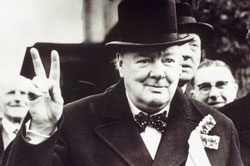
British Prime Minister Winston Churchill gives the victory sign to onlookers.
© Bettmann/CORBIS
The Churchill Centre, a Chicago-based international educational organization devoted to preserving the legacy of 20th-century leader Sir Winston Churchill, has agreed to establish the National Churchill Library and Center at GW through an $8 million pledge to the university. This will be the first permanent American home for Churchill studies and will be located in Gelman Library.
The agreement between the two institutions includes rare books and other research materials for the new center, endowed academic positions for the study of Churchill and British history, and renovations to the ground floor of Gelman Library. The center will open in several stages between 2013 and 2015.
Specifically, the partnership entails a dedicated street-level space for the National Churchill Library and Center; a $2.5 million endowed professorship in Churchill and 20th-century British history in GW's Columbian College of Arts and Sciences; a $2.5 million endowed curatorship of the National Churchill Library and Center; and a $1 million program and collection endowment to fund a wide range of lectures, seminars, programs, and exhibits for scholars, students, and visitors.
An additional $2 million will be provided for renovations to the ground floor of Gelman Library to create the Churchill Library and Center, which will house an extensive collection of books and other research materials by and about Churchill and his times, as well as related exhibition space.
Talks to bring the center to GW began with former university President Stephen Joel Trachtenberg. The project will be developed with the collaboration and support of major Churchill institutions in the United Kingdom, including the Churchill War Rooms and Museum, Chartwell (Churchill's family home, operated by the National Trust), and the Churchill Archives Centre at Churchill College, the University of Cambridge, as well as members of the Churchill family.
A Better Barcroft
Renovation begins on baseball's home field
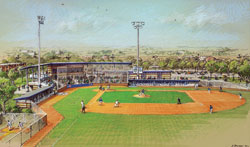
An artist's rendering of proposed improvements to Barcroft Field in Arlington, Va.
Since its inception in 1904, GW's baseball program has led a nomadic life. Shuffled from makeshift locations at Robinson Secondary School in Fairfax, Va., to the White House's West Ellipse, its only respite has come in the past two decades, during which it has been housed at Field No. 6 at Barcroft Park in Arlington, Va.
But Field No. 6 has hardly been an ideal home. Devoid of the GW colors and insignia, with subpar grounds, rusty fencing, and no public restrooms, the Colonials' home base has been in desperate need of an upgrade for years. The patchy field requires constant upkeep just to stay playable, and this effort usually has to be undertaken by members of the team—forcing them to add hours of groundskeeping to their already packed schedules of classes, homework, and athletic games and practice.
Finally, though, the dream of an improved home base for GW's baseball players is becoming a reality after the Barcroft facility was identified as a priority in the university's Athletics Review. The first phase of major renovation began in January, when initial demolition of the existing structure—including the dugouts, backstop, fencing, and scoreboard—was completed and artificial turf installation began.
The field will receive new turf, stadium seating, and other amenities through a partnership between GW and the Arlington County Parks, Recreation, and Cultural Resources Department. Barcroft Park has served as GW's home field since 1993.
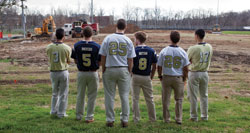
Members of the GW baseball team look on as construction begins on their new and improved playing field.
Jessica McConnell Burt
In hopes of readying the field for the 2012 season, the first phase of renovation will address the playing field, bullpens, and dugouts. Among other enhancements, the field will be upgraded to a top-of-the-line synthetic turf, the fencing will be replaced, and a new windscreen will be installed. New sunken dugouts will accommodate 40 players, coaches, and trainers, and will include wall and overhead storage for equipment as well as a bat rack. Lockable storage space for both dugouts will also be added.
In phase two, attention will turn to upgrading the stadium, including expanded seating, a new press box, and concessions areas. Amenities contingent on fundraising support (such as an upgraded scoreboard, partial overhead awning, and locker rooms) will be incorporated into a final phase of renovation.
Projected overall costs are at least $3 million for the renovation, and GW will share costs of maintenance with the county. In exchange, GW has secured rights to use the field for the next 20 years.
"Combined with the recent dramatic improvements to the Charles E. Smith Center and the Mount Vernon soccer and lacrosse field, the construction of an outstanding new baseball field at Barcroft Park will demonstrate the university's commitment to excellence in intercollegiate athletics," says Randy Levine, BA '77, president of the New York Yankees, who chairs GW's Strategic Planning Committee for Athletics.
Despite the disadvantages of their situation, the Colonials have made a strong showing, with a 291–181–1 record at Barcroft Park. The team's most successful year at Barcroft was in 2003, when it had seven consecutive home victories and ended the season with a 19–3 home record.
"It's a matter of having the right environment," says GW School of Business student Aaron Weisberg, a right-handed pitcher for the Colonials. "We could have the same skills and the same stats as the next team, but having a good facility where we can train, practice, and compete at our best—that's what gives us the competitive edge and helps us develop into truly top-tier athletes."
The New Ames Hall
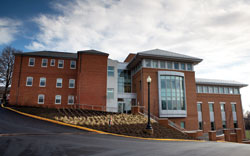
Jessica McConnell Burt
After a year of construction, the renovated and expanded Ames Hall reopened in January, ushering in a new era on the Mount Vernon Campus.
The 50,000-square-foot building on the Quad—35,000 square feet larger than the original Ames—is now the academic centerpiece of Mount Vernon, showcasing five stories of state-of-the-art classrooms, faculty offices, student lounges, and study rooms. The revamped Ames houses a number of prominent academic departments, including the University Writing Program and the University Honors Program.
Open, spacious, and filled with natural light, the building houses the largest classrooms on the Mount Vernon Campus—among them a two-story lecture hall with tiered seating for 125 students. Classrooms are equipped with the latest technology—from LCD projectors and ceiling-mounted document cameras to interactive white boards and touch-screen control systems. Ames also features eight glass-enclosed group study rooms, a café, and a furnished patio overlooking the softball field.
Targeted for silver certification under the Leadership in Energy and Environmental Design (LEED) U.S. Green Building Council rating system, Ames also incorporates a number of sustainable design elements such as a green roof, reflective shingles, energy-efficient heating and cooling systems, insulated windows, motion-activated lights, bike racks, and water bottle-filling stations.
—Jamie L. Freedman
Brian Williams to Deliver Commencement Address
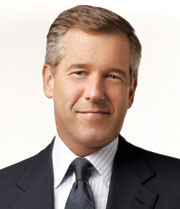
NBC Photo: Justin Stephens
Brian Williams, anchor and managing editor of NBC Nightly News and host of Rock Center, will address this year's graduates at Commencement on the National Mall May 20. Mr. Williams will receive an honorary doctorate and speak to an estimated 25,000 graduates and guests. International businessman and philanthropic leader Carlos Slim and internationally renowned artist and alumna Clarice Smith also will receive honorary degrees from the university.
Mr. Williams began his broadcasting career in 1981 at KOAM-TV in Pittsburg, Kan. He worked at several local stations in Washington, D.C., Philadelphia, and New York City before joining NBC News in 1993. Mr. Williams served as NBC's chief White House correspondent and later assumed the role of anchor and managing editor of The News With Brian Williams on MSNBC and CNBC. In 2007, TIME named him one of the 100 most influential people in the world. In 2011, NBC News launched Rock Center with Brian Williams, the network's first new prime-time newsmagazine in nearly two decades.
"It is an honor to be asked, and I intend to point out the obvious. Every graduate in the audience will have achieved what I failed to do...earn a college degree," Mr. Williams said.
Mr. Williams attended GW for the fall semester of 1980.
Professor Bernanke
Federal Reserve chairman will give students a look inside the central banking system.
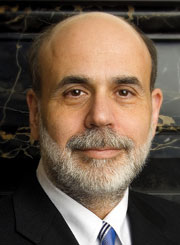 Federal Reserve Chairman Ben Bernanke will deliver four lectures this spring for a class of George Washington undergraduates, giving students a firsthand look at the workings of the country's central banking system.
Federal Reserve Chairman Ben Bernanke will deliver four lectures this spring for a class of George Washington undergraduates, giving students a firsthand look at the workings of the country's central banking system.
The 1.5-credit, seven-week course—"Reflections of the Federal Reserve and Its Place in Today's Economy"—begins March 20. Professor Tim Fort, chair of the Department of Strategic Management and Public Policy, will also teach the class.
Dr. Bernanke began his tenure as chairman in 2006 and is in his second term. He is also the chairman of the Federal Open Market Committee, the system's principal monetary policymaking body, and previously served as a professor of economics and public affairs at Princeton University and assistant professor of economics at Stanford University.
View the lecture online at federalreserve.gov/newsevents/lectures/about.htm.
International Law Expert
United Nations chooses professor for International Law Commission.
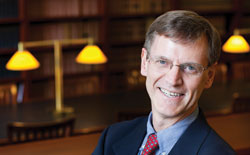
Rick Reinhard
GW Law Professor Sean Murphy has been elected by the United Nations General Assembly to the International Law Commission. The commission consists of 34 distinguished legal scholars, practitioners, and government officials from around the world who are elected to serve for five-year terms. Created in 1948, the objective of the ILC is to codify and progressively develop international law through restatements of the law, studies of legal topics, and draft treaties.
While the U.S. government nominated Mr. Murphy, he serves on the commission as an independent expert.
Mr. Murphy will continue as a full-time professor at the Law School, where he is the Patricia Roberts Harris Research Professor of Law, and he hopes to bring some of his experiences on the ILC back to the classroom.
Topics currently being studied by the ILC include international law on the expulsion of aliens, immunity of heads of state from national criminal jurisdiction, protection of persons in times of disaster, and aut dedere aut judicare (the obligation to extradite or prosecute people who commit heinous crimes).
Before joining the Law School faculty in 1998, Mr. Murphy served as the legal counselor of the U.S. Embassy in The Hague, arguing several cases before the International Court of Justice. He also served as U.S. agent to the Iran-U.S. Claims Tribunal, arguing cases on behalf of the U.S. government and providing advice to U.S. nationals appearing before that tribunal. Between 1987 and 1995, Mr. Murphy worked at the U.S. Department of State Office of the Legal Adviser.
Upcoming Events
March-June
GW and Politics: On the 2012 Campaign Trail
In cities across the U.S.
April 21
Black Alumni Reunion
Washington, D.C.
May 3
Alumni Service Awards
Washington, D.C.
May 9
Women & Philanthropy Forum
Washington, D.C.
alumni.gwu.edu/calendar
George Welcomes…
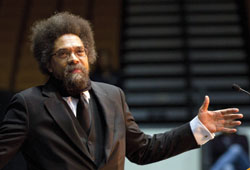 Prominent intellectual Dr. Cornel West—speaker, professor, and author of 19 books—keynoted the three-day "Democracy and Public Argument" conference sponsored by the GW University Writing Program and the Freemasons of Washington, D.C., Justice-Columbia Lodge No. 3, in November. With an audience of about 2,000 at GW's Charles E. Smith Center, Dr. West tackled issues like poverty, unemployment, corporate greed, money and politics, and the concentration of power and wealth. Prominent intellectual Dr. Cornel West—speaker, professor, and author of 19 books—keynoted the three-day "Democracy and Public Argument" conference sponsored by the GW University Writing Program and the Freemasons of Washington, D.C., Justice-Columbia Lodge No. 3, in November. With an audience of about 2,000 at GW's Charles E. Smith Center, Dr. West tackled issues like poverty, unemployment, corporate greed, money and politics, and the concentration of power and wealth.
William Atkins
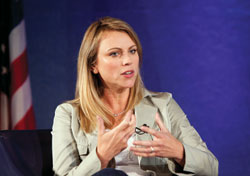 Lara Logan, the award-winning chief foreign correspondent for CBS News, talked about her life on the front lines for the Kalb Report Nov. 7 in the National Press Club. War stories, she said, such as the atrocities against civilians during the Angolan civil war, need to be told or they "never happened." Lara Logan, the award-winning chief foreign correspondent for CBS News, talked about her life on the front lines for the Kalb Report Nov. 7 in the National Press Club. War stories, she said, such as the atrocities against civilians during the Angolan civil war, need to be told or they "never happened."
Jessica McConnell Burt
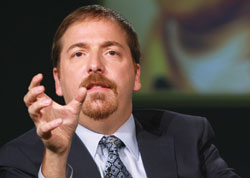 Chuck Todd, chief White House correspondent for NBC, offered his take on the 2012 election race at GW's Jack Morton Auditorium Nov. 28. During the sold-out event, Mr. Todd talked about a number of current political topics, including which Republican presidential candidates will fare well and which will fail. Mr. Todd also took questions from the audience and from Twitter. Chuck Todd, chief White House correspondent for NBC, offered his take on the 2012 election race at GW's Jack Morton Auditorium Nov. 28. During the sold-out event, Mr. Todd talked about a number of current political topics, including which Republican presidential candidates will fare well and which will fail. Mr. Todd also took questions from the audience and from Twitter.
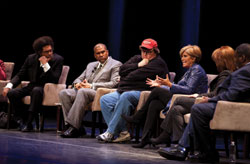 In January, a panel of experts discussed systemic poverty in the United States for a live C-SPAN broadcast from Lisner Auditorium. The panel included (from left) professor Cornel West; broadcaster Tavis Smiley; filmmaker Michael Moore; personal finance guru Suze Orman; Vicki B. Escarra, president of Feeding America; and Roger A. Clay Jr., president of the Insight Center for Community Economic Development. Urban revitalization strategist Majora Carter and author Barbara Ehrenreich were also on the panel. In January, a panel of experts discussed systemic poverty in the United States for a live C-SPAN broadcast from Lisner Auditorium. The panel included (from left) professor Cornel West; broadcaster Tavis Smiley; filmmaker Michael Moore; personal finance guru Suze Orman; Vicki B. Escarra, president of Feeding America; and Roger A. Clay Jr., president of the Insight Center for Community Economic Development. Urban revitalization strategist Majora Carter and author Barbara Ehrenreich were also on the panel.
William Atkins
|
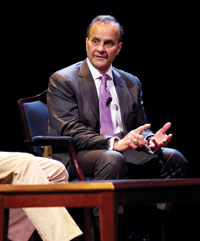 Legendary baseball manager Joe Torre spoke at the university in February, relating stories from his longtime career on the diamond. Mr. Torre—whose many professional accomplishments include leading the Yankees to six pennants and four World Series championships—discussed his management strategies, his personal philosophy, and other topics before a standing-room-only crowd at Lisner Auditorium. Legendary baseball manager Joe Torre spoke at the university in February, relating stories from his longtime career on the diamond. Mr. Torre—whose many professional accomplishments include leading the Yankees to six pennants and four World Series championships—discussed his management strategies, his personal philosophy, and other topics before a standing-room-only crowd at Lisner Auditorium.
William Atkins
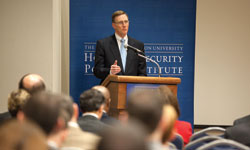 In November, the Transportation Security Administration's John Pistole spoke about progress in airport security over the past 10 years in a speech hosted by the Homeland Security Policy Institute. As TSA administrator, Mr. Pistole oversees 60,000 employees and the security operations of airports, highways, railroads, ports, mass transit systems, and pipelines. In November, the Transportation Security Administration's John Pistole spoke about progress in airport security over the past 10 years in a speech hosted by the Homeland Security Policy Institute. As TSA administrator, Mr. Pistole oversees 60,000 employees and the security operations of airports, highways, railroads, ports, mass transit systems, and pipelines.
Jessica McConnell Burt
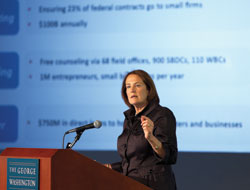 Karen Mills, top official of the U.S. Small Business Administration, joined GW alumni to kick off a series of college campus discussions on entrepreneurship at Jack Morton Auditorium in February. Karen Mills, top official of the U.S. Small Business Administration, joined GW alumni to kick off a series of college campus discussions on entrepreneurship at Jack Morton Auditorium in February.
Jessica McConnell Burt
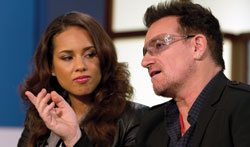
Musicians Bono and Alicia Keys joined a star-studded array of guests—including President Barack Obama—at GW for World AIDS Day in November. At the event, President Obama announced new commitments for AIDS treatment and assistance. Other distinguished guests, including former Presidents George W. Bush and Bill Clinton and Tanzanian President Jakaya Kikwete, addressed the crowd via satellite.
William Atkins
|
At a Glance
A New Strategic Plan
Strategic planning for the next decade at GW is under way, led by Provost Steven Lerman. The plan will enumerate the university's main focus for the next 10 years, culminating in GW's 200th anniversary in 2021. A steering committee has been appointed to guide the process, and working committees have been assigned to explore relevant topics. The university expects to have the plan finalized late in 2012.
The new strategic plan will establish overarching goals while leaving ample room for the wide range of intellectual pursuits and academic programs that engage the faculty and students. A number of the colleges and schools have or will develop their own strategic plans, many of which will strike a balance between university-wide and school-specific goals. Learn more at provost.gwu.edu/strategic-plan.
First in the Peace Corps
For the fourth consecutive year, GW ranks first among medium-sized universities producing Peace Corps volunteers, according to the annual Peace Corps rankings. GW currently has 78 undergraduate alumni serving overseas, and 1,094 alumni have served in the Peace Corps since its inception.
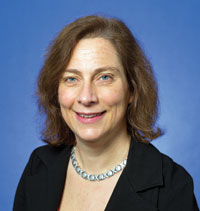 Finnemore Named University Professor
Finnemore Named University Professor
Martha Finnemore, professor of political science and international affairs, is the newest University Professor, joining nine of GW's most distinguished faculty members. A University Professorship is GW's highest faculty rank and recognizes outstanding scholarship. Faculty appointments at this level must be approved by the Board of Trustees. Dr. Finnemore is the second woman to receive the appointment.
Elliott School Rankings
GW's Elliott School of International Affairs' programs and faculty are among the best in the nation and world, according to a survey released by an international relations institute at the College of William and Mary in Williamsburg, Va.
Researchers with the Teaching, Research, and International Policy project conducted the survey, which included responses from 1,582 international relations faculty members. Results were published in Foreign Policy magazine.
In a ranking of scholars who have produced the most interesting scholarship in the past five years, Professors Martha Finnemore and Michael Barnett were listed No. 1 and No. 11 out of 20, respectively. The two were also ranked among 20 scholars who respondents said produced the best work in the field of international relations in the past 20 years. Dr. Finnemore was also No. 13 out of 20 in a ranking of those who have had the greatest influence on the field of international relations in the past 20 years.
Respondents also listed colleges or universities with the best international relations programs. GW's master's program ranked No. 7 in the world, up from No. 8 in the 2009 survey. Only six other universities—Harvard, Princeton, Columbia, Georgetown, the University of Chicago, and American—made both the undergraduate and master's lists.
Teaching for the Autism Spectrum
In January, GSEHD began offering an Autism Spectrum Disorders graduate certificate program aimed at local special education teachers. The program offers a multi-intervention approach to instructing children with different levels of the disorder.
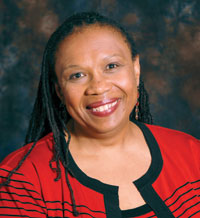
Jessica McConnell Burt
Diversity Council Leader
Vanessa Northington Gamble, University Professor of medical humanities and professor of health policy and American studies, has been appointed chair of the President's Council on Diversity and Inclusion.
The President's Council on Diversity and Inclusion, which President Steven Knapp created in spring 2010, consists of 14 members who represent the breadth of the university community. Its role was to generate ideas and formulate recommendations for increasing the university's effectiveness in reaching out to persons of all backgrounds, and to provide advice and feedback to Terri Harris Reed, vice provost for diversity and inclusion.
One of Dr. Gamble's first goals is to lead the council's efforts to implement the five recommendations selected by the university leadership as top priorities for this year. The recommendations are derived from the report "Diversity: A Key to Academic Excellence," which was released in September.
Researching Crash Safety With Toyota
The GW National Crash Analysis Center, housed at GW's Virginia Science and Technology Campus in Ashburn, Va., has been named as one of Toyota's new Collaborative Safety Research Center research partners.
The center "will be working to develop computer simulation models of [test dummies] for multidirectional vehicle crashworthiness applications," says Steve Kan, NCAC director. "This model will allow researchers and engineers to simulate real-world crash scenarios and assess occupant injury risks. As a result of this research, for the first time we will be able to use computer simulation to evaluate real-world vehicle collisions."
New HR VP
Sabrina Ellis serves as GW's new vice president for human resources. She joined the university in January after working at the City College of New York. At GW, Ms. Ellis leads and manages the central HR organization, and provides professional guidance and direction to the university's HR professionals.
Innovation in Action
ITF focuses on six new initiatives.
 Reducing paper demands, leveraging the expertise of the GW faculty and staff as in-house consultants, and increasing the use of university housing and other facilities are among six new projects selected for a program that has generated millions in savings and new revenue for reinvestment elsewhere around the university.
Reducing paper demands, leveraging the expertise of the GW faculty and staff as in-house consultants, and increasing the use of university housing and other facilities are among six new projects selected for a program that has generated millions in savings and new revenue for reinvestment elsewhere around the university.
The six new initiatives join 11 others greenlighted earlier by the Innovation Task Force, an initiative created by President Steven Knapp in 2009 with the charge of identifying $60 million in annual, recurring savings and new revenue through improvements in GW business operations and new academic programs. The newest enterprises will bring the ITF past the two-thirds mark, with $43 million identified.
The six new initiatives, expected to generate more than $5 million per year beginning in fiscal year 2015, are:
Housing Optimization: Increasing residence hall occupancy—especially in the summer months and in the spring semester—could add an estimated $2.6 million in revenue.
Cloud Computing: The university will look for opportunities to migrate some services into the type of centralized, shared, and web-accessible computing resources known as the "cloud." The results are estimated to save the university $1 million.
Paperless: Saving paper is environmentally friendly and also saves the university on associated costs like ink, printers, copiers, and maintenance. The proposed steps include a paperless graduate admissions process, increasing electronic course evaluations, and the launch of a GW-wide document scanning and retrieval system. Together those changes are estimated to result in savings of $600,000.
More Efficient Customer Service: The university will explore ways to more efficiently answer the frequently asked questions of students, parents, and faculty and staff members. The outcome may include new web-based solutions. The initiative, estimated to save $300,000, is aimed at offering users consistent and reliable information while better utilizing staff.
Expanding Use of Facilities Beyond Academic Year: Some campus facilities are not fully utilized during the summer. Attracting conferences, nonprofit groups, and students to the facilities at the Mount Vernon Campus in the summertime,
for example, could yield an estimated $400,000.
Leveraging In-House Expertise: Even a modest reduction in the use of external consultants, in favor of the expertise of faculty and staff members, is estimated to save the university $200,000.
As this batch of initiatives moves into the detailed planning phase, the ITF will begin vetting ideas for the next round, which will be chosen in the spring.






 Federal Reserve Chairman Ben Bernanke will deliver four lectures this spring for a class of George Washington undergraduates, giving students a firsthand look at the workings of the country's central banking system.
Federal Reserve Chairman Ben Bernanke will deliver four lectures this spring for a class of George Washington undergraduates, giving students a firsthand look at the workings of the country's central banking system.
 Prominent intellectual Dr. Cornel West—speaker, professor, and author of 19 books—keynoted the three-day "Democracy and Public Argument" conference sponsored by the GW University Writing Program and the Freemasons of Washington, D.C., Justice-Columbia Lodge No. 3, in November. With an audience of about 2,000 at GW's Charles E. Smith Center, Dr. West tackled issues like poverty, unemployment, corporate greed, money and politics, and the concentration of power and wealth.
Prominent intellectual Dr. Cornel West—speaker, professor, and author of 19 books—keynoted the three-day "Democracy and Public Argument" conference sponsored by the GW University Writing Program and the Freemasons of Washington, D.C., Justice-Columbia Lodge No. 3, in November. With an audience of about 2,000 at GW's Charles E. Smith Center, Dr. West tackled issues like poverty, unemployment, corporate greed, money and politics, and the concentration of power and wealth. Lara Logan, the award-winning chief foreign correspondent for CBS News, talked about her life on the front lines for the Kalb Report Nov. 7 in the National Press Club. War stories, she said, such as the atrocities against civilians during the Angolan civil war, need to be told or they "never happened."
Lara Logan, the award-winning chief foreign correspondent for CBS News, talked about her life on the front lines for the Kalb Report Nov. 7 in the National Press Club. War stories, she said, such as the atrocities against civilians during the Angolan civil war, need to be told or they "never happened." Chuck Todd, chief White House correspondent for NBC, offered his take on the 2012 election race at GW's Jack Morton Auditorium Nov. 28. During the sold-out event, Mr. Todd talked about a number of current political topics, including which Republican presidential candidates will fare well and which will fail. Mr. Todd also took questions from the audience and from Twitter.
Chuck Todd, chief White House correspondent for NBC, offered his take on the 2012 election race at GW's Jack Morton Auditorium Nov. 28. During the sold-out event, Mr. Todd talked about a number of current political topics, including which Republican presidential candidates will fare well and which will fail. Mr. Todd also took questions from the audience and from Twitter.  In January, a panel of experts discussed systemic poverty in the United States for a live C-SPAN broadcast from Lisner Auditorium. The panel included (from left) professor Cornel West; broadcaster Tavis Smiley; filmmaker Michael Moore; personal finance guru Suze Orman; Vicki B. Escarra, president of Feeding America; and Roger A. Clay Jr., president of the Insight Center for Community Economic Development. Urban revitalization strategist Majora Carter and author Barbara Ehrenreich were also on the panel.
In January, a panel of experts discussed systemic poverty in the United States for a live C-SPAN broadcast from Lisner Auditorium. The panel included (from left) professor Cornel West; broadcaster Tavis Smiley; filmmaker Michael Moore; personal finance guru Suze Orman; Vicki B. Escarra, president of Feeding America; and Roger A. Clay Jr., president of the Insight Center for Community Economic Development. Urban revitalization strategist Majora Carter and author Barbara Ehrenreich were also on the panel. Legendary baseball manager Joe Torre spoke at the university in February, relating stories from his longtime career on the diamond. Mr. Torre—whose many professional accomplishments include leading the Yankees to six pennants and four World Series championships—discussed his management strategies, his personal philosophy, and other topics before a standing-room-only crowd at Lisner Auditorium.
Legendary baseball manager Joe Torre spoke at the university in February, relating stories from his longtime career on the diamond. Mr. Torre—whose many professional accomplishments include leading the Yankees to six pennants and four World Series championships—discussed his management strategies, his personal philosophy, and other topics before a standing-room-only crowd at Lisner Auditorium. In November, the Transportation Security Administration's John Pistole spoke about progress in airport security over the past 10 years in a speech hosted by the Homeland Security Policy Institute. As TSA administrator, Mr. Pistole oversees 60,000 employees and the security operations of airports, highways, railroads, ports, mass transit systems, and pipelines.
In November, the Transportation Security Administration's John Pistole spoke about progress in airport security over the past 10 years in a speech hosted by the Homeland Security Policy Institute. As TSA administrator, Mr. Pistole oversees 60,000 employees and the security operations of airports, highways, railroads, ports, mass transit systems, and pipelines. Karen Mills, top official of the U.S. Small Business Administration, joined GW alumni to kick off a series of college campus discussions on entrepreneurship at Jack Morton Auditorium in February.
Karen Mills, top official of the U.S. Small Business Administration, joined GW alumni to kick off a series of college campus discussions on entrepreneurship at Jack Morton Auditorium in February. 
 Finnemore Named University Professor
Finnemore Named University Professor
 Reducing paper demands, leveraging the expertise of the GW faculty and staff as in-house consultants, and increasing the use of university housing and other facilities are among six new projects selected for a program that has generated millions in savings and new revenue for reinvestment elsewhere around the university.
Reducing paper demands, leveraging the expertise of the GW faculty and staff as in-house consultants, and increasing the use of university housing and other facilities are among six new projects selected for a program that has generated millions in savings and new revenue for reinvestment elsewhere around the university.